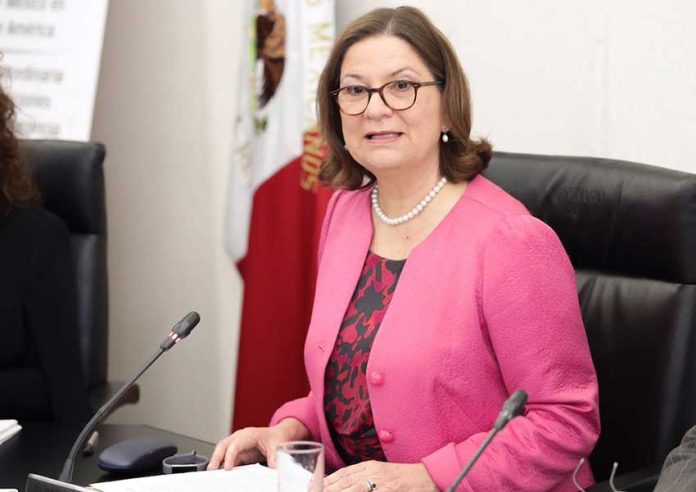Mexico needs to have a “thick skin” to deal with United States President Donald Trump, according to the newly-appointed ambassador to the U.S., who said that if he crosses the line it will be up to President López Obrador to decide on an appropriate response.
As Trump prepares to address the United States tonight on what he called yesterday “the humanitarian and national security crisis on our southern border,” Martha Bárcena is preparing to assume the role of Mexico’s top diplomat in Washington D.C.
The 61-year-old Veracruz native, who has previously been the Mexican ambassador to Denmark and Turkey, will present her credentials to Trump on Friday.
Bárcena called the United States president a “confrontational man” in an interview with the newspaper El Universal and described her job as an “enormous challenge” but vowed to “establish a new era” in bilateral relations between Mexico and the United States.
Ties between the two countries deteriorated after Trump took office in January 2017, with the U.S. president’s border wall proposal – and the source of its funding – a primary source of tension.
After a testy phone call between Trump and former president Enrique Peña Nieto last February, Mexican journalist Carlos Loret de Mola described the climate of relations between the two countries as “frozen.”
But Bárcena, who has 40 years’ experience in Mexico’s foreign service, believes that President López Obrador’s landslide victory in last year’s election provides a strong mandate for change at home and that acting on that mandate will, in turn, work to Mexico’s benefit abroad: in her case, within the context of Mexico’s relations with the United States.
“[When I] arrive in the United States . . . it won’t be business as usual, we’re going to do things differently and confront problems that for some time we know have worried not only . . . the United States but also our [other] principal partners, things like high-level corruption, insecurity and violence, which are already being confronted. All that provides strength to negotiate with the United States,” she said.
“One of the priorities this year is the ratification of the [trade] treaty between Mexico, the United States and Canada . . . Another priority will be to review . . . the situation of Mexicans in the United States, what immigration legislation is being presented in the Senate, the House of Representatives. You have to remember that it is the legislative power that has authority over immigration legislation,” Bárcena said.
The arrival of thousands of Central American migrants in northern border cities in the final two months of 2018, especially Tijuana, has further complicated relations between Mexico and the United States.
While the personal relationship between López Obrador and Trump has thus far been largely respectful, Bárcena acknowledged that the bilateral relationship is at a critical point.
“. . . When President López Obrador spoke to me just after the elections to express his interest in me being his ambassador in Washington, I knew it was an enormous challenge but I didn’t imagine that I was going to arrive in the United States in such a tense and polarized situation as there is now. It’s an enormous challenge,” Bárcena said.
Asked what her approach would be for dealing with Trump, especially considering his predilection for using Twitter to fire off broadsides whose targets have included the Mexican government, Bárcena responded that it would largely be through the institutions of the United States government.
“The ambassador and the embassy have to be aware of what President Trump says because he’s the leader of the United States but dialogue between ambassadors and the president of another country is not daily,” she said.
The new ambassador opined: “I believe that in some matters, you have to have a thick skin. In other matters, you have to know where the line is . . . I would hope, I believe that President Trump is conscious of the importance of Mexico, I think that he has to be careful . . .”
Bárcena claimed that Trump “is a confrontational man in everything, not just with Mexico,” adding that if he does cross the line “the final decision about what should be done is for the president [López Obrador] himself.”
However, she warned that “intervening constantly” in the debate about the border wall and border security in the United States “probably won’t take us or lead us to anything positive.”
Asked whether López Obrador would take up Trump’s invitation to travel to the White House, Bárcena said that it would depend on how relations between Mexico and the United States evolve as well as the respective schedules of the two presidents.
Reminded of López Obrador’s assertion that he would only go to Washington if there was “a motive” or something important to announce, Bárcena responded: “In that case, I’ll have to get down to work so that there are important things to announce.”
Another diplomatic position waiting to be filled is that of the U.S. ambassador to Mexico. The position has been vacant since Roberta Jacobson resigned and left the post last May.
Source: El Universal (sp), La Razón (sp)
